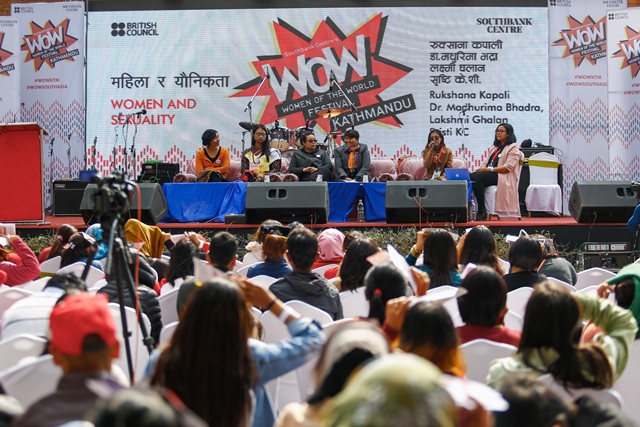Culture & Lifestyle
Celebrating indigenous women narratives
The third iteration of WOW festival which is set to kick off this Friday, will focus on the Madhes belt of Nepal to discuss gender equality..jpg&w=900&height=601)
Srizu Bajracharya
In a black-white photo series by Nabin Baral, a photograph shows a middle-aged woman in a dull sari violently shaking her hair; her hands are held high in the air as though she is pleading to someone. But her frantic moves tell the spectators that she is in a trance. In the picture, a child behind her is seen peering at her, while the other women in the frame have their heads down. The description reads, “Women are often made to believe ghosts and witches are the cause for their family’s bad economic conditions, illnesses or deaths.”
It is a horrific rendition, and perhaps a picture that never really surfaces as much as frames of people smiling in our social media feeds. But as British Council gears for its third iteration of the Women of the World (WOW) festival, of which Baral’s photo series is also a part, it promises to discuss all kinds of women stories to understand the struggles, and celebrate the achievements of women.
The festival, which was originally founded in London by British theatre director and producer Jude Kelly, aims to celebrate the long journey of women across the world who have fought patriarchy and over the years, defined the strength of women in different settings.
In an interview with ‘Showcase’, an arts and culture programme that airs on TRT World, a Turkish television channel, Kelly explained, to push the achievements of women forward and to break the patriarchal narrative of the society, it is important for women to know stories of women from different parts of the world.
“The festival is not a conference or an academic gathering. It is also not for someone who fancies having a great time. It’s actually an opportunity for people to hear other people’s stories and learn from them,” she had said. “And that does require stories of women who have been single parent, have medical health problems, have dealt with the trauma of sexual harassment and sexual assault. And all of these stories can’t come from one person. The intention is to reach as many people as we can.”
Following the very essence of Kelly’s vision, the British Council is taking this festival to Janakpur in Province 2 this year, with the hopes that the celebration will discuss important issues of gender diversity, social acceptance and the need of gender-sensitive policies and planning.
In national statistics, Province 2 is also reported as one of the regions with the highest number of cases on violence against women, says Nhooja Tuladhar, arts officer at British Council.
“We thought it would be good to focus on the Madhes belt, as it is generally overlooked and also because Janakpur, although culturally rich, is underrated,” he says.

The WOW festival emulates a consistent format across all countries. It hosts workshops, panel discussions, exhibitions, speed mentoring, marketplace and bites on various issues concerning women. #WOWMadhesh will also bring forward indigenous women narratives and discussions on gender equality-related issues and development works.
This year, the festival also anticipates a diverse audience, as the organisers say they have personally reached out to individuals with diverse backgrounds, instead of focusing their promotion only through social media platforms.
While most art and literature festivals when hosted outside the Valley have a tendency to transport experts and content to the location, the festival has collaborated with local personalities. The festival aims to empower the cultural setting of Janakpur and has many speakers and artistes from Janakpur performing and hosting programmes at the two-day event.
The second day of the event will also see a performance of Jhijhiya dance from women of the Musahar community and a staged performance retelling the journey of Goddess Sita, a highly revered deity in Hinduism.
“The event is organised by a diverse group of women to close down the gender disparity that is so pervasive in our society,” says Tuladhar. “It is not just for feminists, but for everyone to understand the changing women narratives.”
The festival will be held on December 6-7, at various temples in Janakpur.




 9.83°C Kathmandu
9.83°C Kathmandu

.jpg&w=200&height=120)













